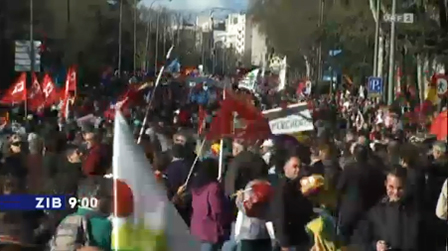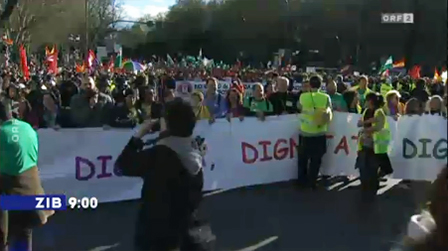Erstellt am: 24. 3. 2014 - 17:36 Uhr
Spain protesting again

Guy Hedgecoe
By Guy Hedgecoe, Madrid
In recent months, Spain has pulled out of a two-year recession, the number of its unemployed has fallen for the first time in half a decade and, what's more, it has successfully exited a banking rescue package. That all sounds like great news. So why were tens of thousands of people of all ages packed into central Madrid on Saturday, voicing their anger at the direction the country is heading?
There's no single answer, although the economy is a major reason. While it is growing again, the recovery is very weak. And more relevantly for most ordinary Spaniards, the jobless rate is still extremely high, at nearly 26 percent.

ORF
It is true that the number of people registered as out of work fell slightly in 2013, but that had a lot to do with the fact that many Spaniards left the country seeking work elsewhere. Emigration has become one of the big legacies of the recent economic crisis, and with unemployment at over 50 percent among under-25s, many young people are heading to Germany, the UK, France and Scandinavia in search of a better life.
But there were other reasons for the massive turnout on Saturday. Even many of those who do have a job are up in arms, because of the cuts that the government of Mariano Rajoy has made to social spending. Spaniards are deeply proud of the advances their country made after leaving behind dictatorship and embracing democracy in the late 1970s. They see public health and education as basic pillars of a modern, free country. So when Rajoy's Popular Party government has slashed spending on those areas in order to follow EU orders and balance the public finances, many believe he has set the country back decades in terms of social progress.
There was also a more general discontent brewing in the Plaza de Colon, the epicenter of Saturday's protest. Ever since the economic crisis started to bite in 2009, Spain's political parties, its banks, judges and even its royal family have all been losing credibility. The democratic system, which was created over four decades ago in what became known as “the transition”, is starting to look distinctly rusty to many voters.
“Most political parties and trade unions aren't doing anything for the people,” a young protester called Adrian Molina told me. “We have a very poor democracy and I think we should create something new.”

ORF
In a strange quirk of fate, the day after the Madrid demonstration, a founding father of modern Spanish democracy, Adolfo Suarez, died. The first elected prime minister after the dictatorship of Francisco Franco, Suarez is credited with leading Spain through what became known as “the transition” to political modernity. He had an extraordinary ability to reach out to different political groups – from supporters of Franco on the far right to orthodox communists on the left – and build consensus.
That contrasts with what many see as the tribal, party-first-country-second attitude of Spain's contemporary politicians. With a stream of corruption cases plaguing several of the main political parties in recent years (including Rajoy's PP) it's no wonder that many Spaniards look back fondly at the Suarez era and hanker for a “new transition”.
This social discontent isn't new. The 'indignados' protest movement, which inspired Occupy Wall Street, sprang up in Spain in 2011. It hasn't managed to maintain the initial momentum of its earliest demonstrations, when protesters camped out in Madrid's Puerta del Sol square for weeks on end, demanding an overhaul of the political and economic system. But the 'indignados' are still active in neighborhoods across Spain, organizing networks to help people who are struggling with unemployment or their mortgage payments.
Perhaps that protest movement's biggest legacy has been to put Spain's beleaguered democracy under the microscope and prompt people to ask: don't we deserve better than this?
Spain's economy may be starting to get back on track. But many people believe its democracy still has a long way to go.

